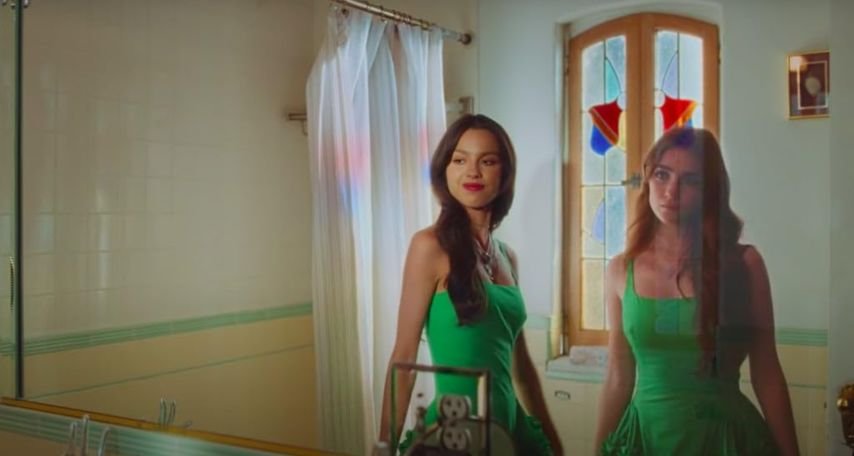Olivia Rodrigo’s Deja vu is a deliciously catchy earworm that burrows its way into your brain.
The track seamlessly blends elements of psychedelic pop, pop rock, art pop, and indie pop into an irresistible sonic concoction.
From the opening notes, it envelops listeners in a dreamy, nostalgic haze. The instrumentation is a masterclass in meticulous yet understated production.
A simple yet insistent piano line forms the melodic backbone, complemented by the whimsical twinkling of a glockenspiel.
Buoyant synths wash over the mix, giving it a hazey, kaleidoscopic quality. As the pre-chorus hits, the pulsating kick of heavy drums elevates the intensity.
At the heart of it all are Rodrigo’s stellar vocals. Her voice has a rare mixture of youthful vulnerability and mature confidence.
She effortlessly glides from airy, lamenting verses to soaring, impassioned harmonies in the choruses.
There’s an intimate, conversational quality to her delivery that makes you feel like you’re getting vivid personal vignettes from her life.
Rodrigo’s emotive range is staggering as she vacillates between bratty sarcasm at an ex-lover’s reused romantic gestures and deep melancholy over having her memories seemingly discarded.
It culminates in that transcendent, ghostly bridge where her layered vocal refrains hauntingly linger in your mind long after the song ends.
Olivia Rodrigo’s Deja Vu wasn’t just a follow-up to her chart-dominating debut single, Drivers Licence; it was a declaration of artistic versatility and a deeper plunge into the tumultuous emotions of young love.
Released on April 1, 2021, as the second single from her critically acclaimed album “Sour,” Deja Vu cemented Rodrigo’s status as a pop phenomenon while offering a relatable and poignant exploration of heartbreak.

A Song Crafted in a Day
The genesis of Deja Vu was a swift one. In August 2020, fresh off the success of “Drivers Licence,” Rodrigo and producer Dan Nigro penned the song in a single day.
The inspiration? A lyric Rodrigo had stockpiled in her phone:
“When she’s with you, do you get deja vu?”
This evocative line sparked the creative fire, and together, Rodrigo and Nigro weaved a narrative that resonated with millions.
Deja Vu: A Metaphor for Repetitive Heartbreak
Rodrigo explained her concept for Deja Vu, revealing, “I get deja vu all the time. So I thought it would be a cool play on words to use deja vu as a metaphor for this very universal thing that happens when you break up with someone and they get with somebody else, and see them living the life that you lived.”
This unsettling experience of witnessing your ex-partner replicate aspects of your relationship with someone new is the crux of Deja Vu’s emotional core.
A Lyrical Deep Dive: Nostalgia and Possessiveness
The song’s verses paint vivid pictures of a past romance, filled with shared experiences like California road trips, strawberry ice cream, and even shared clothing.

“I bet she’s bragggin’ to all her friends, sayin’ you’re so unique, hmm.“
This hints at a tinge of possessiveness and disbelief that the ex-boyfriend could recreate such a unique connection.
The chorus takes a more confrontational approach. Rodrigo directly addresses her ex, questioning if he ever experiences “deja vu” when with his new girlfriend.
“So when you gonna tell her that we did that, too?/She thinks it’s special, but it’s all reused.”
This exposes vulnerability and a touch of anger. The chorus’s repeated use of “Deja Vu” underscores the cyclical nature of heartbreak and the unsettling sensation of reliving a past love story.
Bridge: A Surge of Emotional Honesty
The bridge of Deja Vu is a powerful surge of emotional honesty. Rodrigo accuses her ex of playing Billy Joel’s “Uptown Girl” for his new girlfriend, a detail that meddles even deeper into the wound.
The line, “I was the one who taught you Billy Joel,” underscores a sense of betrayal and the unsettling feeling of being replaced by a mere copy.
Cathartic Release in the Outro
Despite the pain and possessiveness woven throughout the lyrics, “Deja Vu” ultimately offers a cathartic release. The repeated line “I know you get deja vu” in the outro feels like a knowing assertion.
While the situation may be heartbreaking, there’s a sense of closure and acceptance in acknowledging the shared experience, even if it’s a painful one.

Deja Vu’s Enduring Impact
Deja Vu was a critical and commercial success. It debuted at number eight on the Billboard Hot 100, solidifying Rodrigo’s place as a pop force.
The accompanying music video, directed by Allie Avital, further amplified the song’s themes with its portrayal of Rodrigo witnessing her ex recreate their relationship with his new girlfriend, played by actress Talia Ryder.
There’s a scene where Rodrigo tries on the same green dress as Ryder, highlighting the visual parallels between the past and present relationships.
The video’s climax features a powerful display of anger as Rodrigo smashes television sets with a sledgehammer, a stark contrast to the dreamy nostalgia of the song’s opening.
The video garnered millions of views and added another layer to the song’s cultural impact.
Beyond Deja Vu: A Lasting Legacy
Deja Vu is more than just a heartbreak anthem; it’s a song that captures the complexities of young love, the sting of betrayal, and the eventual acceptance of a bygone relationship.
It cemented Olivia Rodrigo’s status as a relatable and talented artist, paving the way for her continued success.
So, the next time you hear the opening notes of Deja Vu, take a moment to appreciate the song’s raw portrayal of heartbreak, its clever use of metaphor, and its undeniable place in contemporary pop culture.
You might also like:
- Beyonce Jolene: The Queen’s Fiery Rendition of a Country Classic
- Dasha Austin Cranks Up the Attitude with Viral Smash Austin
- Decoding the Layered Meaning in Chappell Roan’s Good Luck, Babe! Lyrics
- Djo Keery Waves Goodbye to His Past on Nostalgic Hit End of Beginning
- Laufey’s From The Start: An Intoxicating Jazz-Pop Gem of Unrequited Love
- Artemas’ Raw Honesty Takes Over With i like the way you kiss me
Olivia Rodrigo Deja Vu Lyrics
Verse 1
Car rides to Malibu
Strawberry ice cream, one spoon for two
And tradin’ jackets
Laughin’ ’bout how small it looks on you
(Ha-ha-ha-ha, ha-ha-ha-ha-ha, ha-ha-ha-ha)
Watching reruns of Glee
Bein’ annoying, singin’ in harmony
I bet she’s braggin’ to all her friends, sayin’ you’re so unique, hmm
Chorus
So when you gonna tell her that we did that, too?
She thinks it’s special, but it’s all reused
That was our place, I found it first
I made the jokes you tell to her when she’s with you
Do you get déjà vu when she’s with you?
Do you get déjà vu? (Ah) Hmm
Do you get déjà vu, huh?
Verse 2
Do you call her, almost say my name?
’Cause let’s be honest, we kinda do sound the same
Another actress
I hate to think that I was just your type
And I bet that she knows Billy Joel
’Cause you played her “Uptown Girl”
You’re singin’ it together
Now I bet you even tell her how you love her
In between the chorus and the verse (Ooh; I love you)
Chorus
So when you gonna tell her that we did that, too?
She thinks it’s special, but it’s all reused
That was the show we talked about
Played you the songs she’s singing now when she’s with you
Do you get déjà vu when she’s with you?
Do you get déjà vu? (Oh-oh)
Do you get déjà vu?
Bridge
Strawberry ice cream in Malibu
Don’t act like we didn’t do that shit, too
You’re tradin’ jackets like we used to do
(Yeah, everything is all reused)
Play her piano, but she doesn’t know (Oh, oh)
That I was the one who taught you Billy Joel (Oh)
A different girl now, but there’s nothing new
Outro
I know you get déjà vu
I know you get déjà vu
I know you get déjà vu


